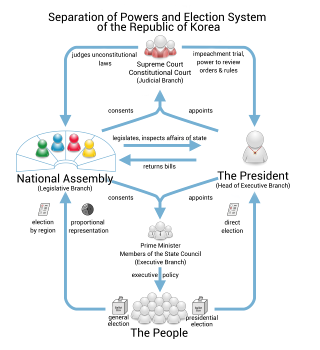
The politics of South Korea take place in the framework of a presidential representative democratic republic,whereby the president is the head of state,and of a multi-party system. To ensure a separation of powers,the Republic of Korea Government is made up of three branches:legislative,executive,and judicial. The government exercises executive power and legislative power is vested in both the government and the National Assembly. The judiciary is independent of the executive and the legislature and comprises a Supreme Court,appellate courts,and a Constitutional Court.

Kim Dae-jung was a South Korean politician and activist who served as the 8th president of South Korea from 1998 to 2003.
The Liberty Korea Party (Korean: 자유한국당) was a conservative political party in South Korea that was described variously as right-wing,right-wing populist,or far-right. Until February 2017,it was known as the Saenuri Party,and before that as the Hannara Party from 1997 to 2012,both of which are still colloquially used to refer to the party. The party formerly held a plurality of seats in the 20th Assembly before its ruling status was transferred to the Democratic Party of Korea on 27 December 2016,following the creation of the splinter Bareun Party by former Saenuri members who distanced themselves from President Park Geun-hye in the 2016 South Korean political scandal.

The Democratic Party was a political party in South Korea. Formerly named Millennium Democratic Party,it was renamed on 6 May 2005. After its dissolution,its members joined the Uri Party or the successor Democratic Party.

The Democratic Labor Party was a progressive and nationalist political party in South Korea. It was founded in January 2000,in the effort to create a political wing for the Korean Confederation of Trade Unions which was considered more left-wing and more independent of the two union federations in South Korea. Its party president was Kwon Young-gil,Kang Gi-gap,and Lee Jung-hee. In December 2011,the party merged into the Unified Progressive Party.

The Yeollin Uri Party,generally abbreviated to Uri Party,was the ruling social-liberal political party in South Korea from 2003 to 2007. A liberal party,it was created to support then-President Roh Moo-hyun. Chung Sye Kyun was the last leader of the party and twice served as its chairman. In 2007 the party merged the United New Democratic Party to form the Democratic Party. The current-day descendant of the party is the Democratic Party of Korea,but progressives in the party have become members of the Justice Party.
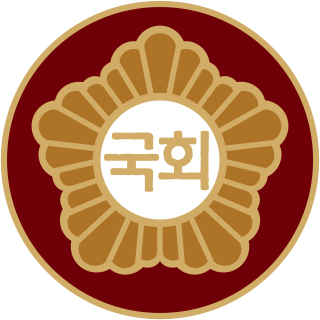
The National Assembly of the Republic of Korea,often shortened to the National Assembly,is the unicameral national legislature of South Korea. Elections to the National Assembly are held every four years. The latest legislative elections was held on 10 April 2024. The current National Assembly held its first meeting,and also began its current four year term,on 30 May 2024. The next Speaker was elected 5 June 2024. The National Assembly has 300 seats,with 253 constituency seats and 47 proportional representation seats;30 of the PR seats are assigned an additional member system,while 17 PR seats use the parallel voting method.

Kim Jong-pil,also known colloquially as JP,was a South Korean politician and the founder/first director of the Korean Central Intelligence Agency. He served as Prime Minister twice,from 1971 to 1975 during the presidency of Park Chung Hee (1961–1979) and from 1998 to 2000 during the presidency of Kim Dae-jung (1998–2003). He was a nine-term National Assembly member.
This article gives an overview of liberalism and its related history in South Korea. It is limited to liberal parties with substantial support,mainly proven by having had a representation in parliament.

The Workers' Party of Korea (WPK) is the sole ruling party of the Democratic People's Republic of Korea,commonly known as North Korea. Founded in 1949 from a merger between the Workers' Party of North Korea and the Workers' Party of South Korea,the WPK is the oldest active party in Korea. It also controls the Korean People's Army,North Korea's armed forces. The WPK is the largest party represented in the Supreme People's Assembly and coexists with two other legal parties that are completely subservient to the WPK and must accept the WPK's "leading role" as a condition of their existence. The WPK is banned in the Republic of Korea under the National Security Act and is sanctioned by the United Nations,the European Union,Australia,and the United States.

Legislative elections were held in South Korea on 13 April 2000.

The National Congress for New Politics was a political party of South Korea.
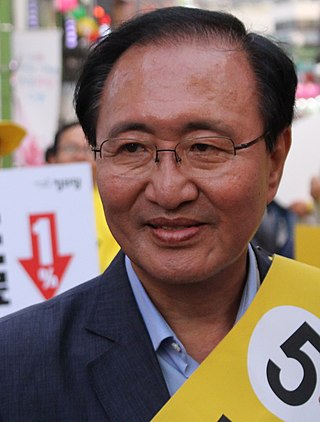
Roh Hoe-chan was a South Korean politician. He was a member of the 17th,19th,and 20th National Assemblies. Roh was involved with multiple progressive-leaning parties,lately with the Justice Party from 2012 until his death in 2018.
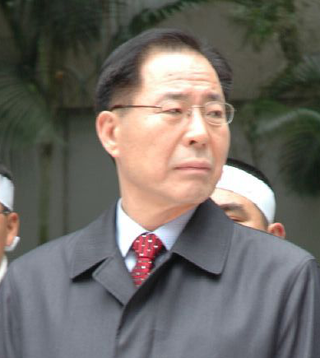
Kwon Young-ghil is a South Korean politician,journalist,and trade unionist. He was a founding member of the People's Victory 21 and Democratic Labour Party.
The People's Participation Party was a political party of South Korea. It was formed by many of the former members of the Uri Party after the death of former President Roh Moo-hyun. Rhyu Si-min was elected as Party Chairman on March 19,2011. In March 2011 it had 45,335 members. For the April 27 by-elections,the People's Participation Party has cooperated with the Democratic Party to enter Lee Bong-su as the single opposition candidate for the Kimhae seat in the National Assembly of South Korea. On 5 December 2011,it merged into the Unified Progressive Party.

The Secretariat of the Workers' Party of Korea,formerly known as the Executive Policy Bureau (2016–21),manages the work of the Politburo of the Workers' Party of Korea and its Presidium. The General Secretary leads the work of the Secretariat,and the body is composed of several members.
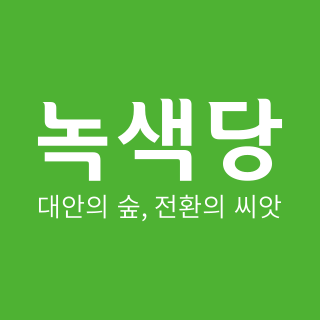
Green Party Korea is a political party in South Korea. The party was established in March 2012. It is a continuation of the Korea Greens,created following initial discussions in 2011. The party was established in response to the Fukushima Nuclear Crisis of Japan. Green Party Korea is a member of the Global Greens and the Asia Pacific Greens Federation.

Yoo Seong-min,also known as Yoo Seung-min,is a South Korean economist and politician. Yoo is former a member of the Korean Parliament and was the Bareun Party's presidential nominee in the 2017 South Korean presidential election. He is the son of late Daegu court chief,attorney and Member of Parliament,Yoo Soo-ho for Junggu of Daegu.
Saenuri Party is a conservative political party in South Korea,founded by supporters of Park Geun-hye. It opposed her impeachment.
















